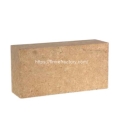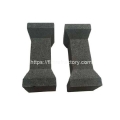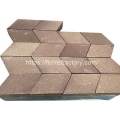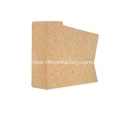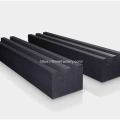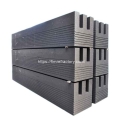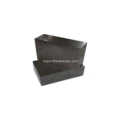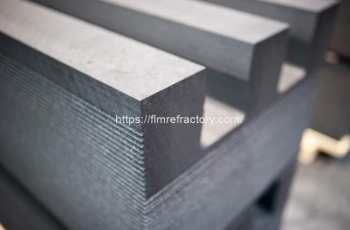- Performance. Innovation. Worldwide. Your trustworthy Refractories Manufacturing Partner--Fireramo
- +86 175 3769 7777
Anode Carbon Brick
- Category: Carbon Brick
- |
- Author: Fireramo
Anode carbon bricks are formed by heating treatment of carbon sources such as carbon, coke or graphite. Anode carbon bricks have high refractoriness, high hardness and good thermal shock resistance.
- Origin: China
- Product Name: Fireramo Anode Carbon Brick
- OEM/ODM: Support
- Refractoriness (℃): 1770< Refractoriness< 2000
- Feature: Long Time Materials
- Type: Refractory Material
- Material: Graphitized Cathode Block
- Bulk Density: ≥1.54G/Cm3
Search
Contact
High quality refractory bricks
Product Details
Anode Carbon Brick for Sale
Description
Anode Carbon Brick is a kind of carbon refractory used for making carbon refining equipment, which is formed by heating treatment of carbon, coke or graphite and other carbon sources. Anode carbon bricks are widely used in carbon refining equipment due to their high refractoriness, high hardness and good thermal shock resistance.


Features
High refractoriness
Anode carbon bricks have high carbon content, high thermal stability and can withstand high temperatures and pressures, which makes them suitable for high-temperature working environments, such as high-temperature smelting and furnaces.
High Hardness
The hardness of anode carbon bricks is very high, usually around 9~9.5 on the Mohs hardness scale, which is not easy to wear out and flake off, and can ensure the stability and life of the anode.
Good thermal shock resistance
Anode carbon bricks have good thermal shock resistance, can withstand rapid changes in temperature, not easy to crack and spalling, improving the life and safety of the equipment.
Good electrical conductivity
Anode carbon bricks have excellent electrical conductivity, which can increase the anode current density and thus improve the capacity of aluminum electrolyzer and reduce power consumption.
Good thermal shock
Anode carbon bricks have good thermal shock, can withstand rapid changes in temperature and high-temperature melt washout, improving the stability and reliability of the equipment.
Good oxidation resistance
Carbon anode bricks are not easy to oxidize under high temperature, and can maintain the stability and integrity of the structure, which improves the life and safety of the anode.
Application
Aluminum Electrolysis Production
Anode carbon brick is an important part of aluminum electrolyzer, used to transfer current and generate oxygen, and participate in the electrochemical reaction of aluminum production. The performance of anode bricks has a direct impact on the efficiency and quality of the aluminum electrolyzer.
Chemical Industry
Anode carbon bricks can be used for electrodes, reactors, heating furnaces and other parts of chemical equipment, featuring good corrosion resistance, good electrical conductivity and strong mechanical properties.
Metallurgical Industry
Anode carbon bricks can be used for electrodes, melting furnaces, heating furnaces and other parts in metallurgical equipment, characterized by high temperature resistance and corrosion resistance.
Electric power industry
Anode carbon bricks can be used in electrodes, electrolysis tanks, heat exchangers and other parts of electric power equipment, characterized by good conductivity, high temperature resistance, corrosion resistance and so on.
Iron and Steel Industry
Anode carbon bricks are used in the steel industry to make furnace lining materials for steel, which can withstand high temperature and chemical erosion, and at the same time can reduce the oxidation loss of steel.
Aerospace Industry
Carbon anode bricks are able to withstand high temperature and high pressure environments, and are used in the aerospace industry to manufacture nozzles and combustion chambers for rocket engines.
Anode Carbon Brick Specifications
| Item | Unit | Common Carbon Block | |
|---|---|---|---|
| Ash | % | ≤8 | |
| Electrical Resistivity | μΩm | ≤55 | |
| At Normal Temperature | |||
| Sodium (Na Expansion) | % | ≤1.5 | |
| Real Density | g/cm3 | ≥1.88 | |
| Bulk Density | g/cm3 | ≥1.54 | |
| Compressive Strength | MPa | ≥32 | |
| Flexual Strength | MPa | _ | |
| Thermal Conductivity | 30ºC | W/(m·K) | _ |
| 600ºC | _ | ||
| Linear Thermal Expansion | ×10-6/ºC | _ | |
| (300ºC) |
| Item | Semi-graphitic Cathode Block | |||
|---|---|---|---|---|
| GS-1 | GS-3 | GS-5 | GS-10 | |
| Ash | ≤7 | ≤5 | ≤4 | ≤2 |
| Electrical Resistivity | ≤39 | ≤35 | ≤30 | ≤21 |
| At Normal Temperature | ||||
| Sodium (Na Expansion) | ≤1.0 | ≤0.6 | ≤0.5 | ≤0.5 |
| Real Density | ≥1.91 | ≥1.95 | ≥2.01 | ≥2.08 |
| Bulk Density | ≥1.56 | ≥1.57 | ≥1.57 | ≥1.59 |
| Compressive Strength | ≥32 | ≥24 | ≥24 | ≥26 |
| Flexual Strength | ≥10 | ≥7.0 | ≥7.0 | ≥7.5 |
| Thermal Conductivity | – | ≥12 | ≥15 | ≥20 |
| – | ≥14 | ≥20 | ≥30 | |
| Linear Thermal Expansion | ≤4.2 | ≤4.0 | ≤4 | ≤4 |
Specializing in refractory materials for over 20 years, we provide professional refractory solutions for the global high temperature industry.
Theme By Fireramo
